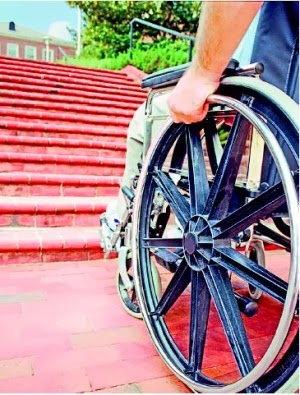India's Census
2001 showed that over 21 million people (around 2.1% of the total population) as suffering from one or the other kind of disability, the website of the
Office of the Registrar of General & Census Commissioner said.
Among
the total disabled in the country, 12.6 million are males and 9.3 million are
females. Data had been collected on 5
types of disabilities and disability ‘In seeing’ at 48.5% stood at No.1
position. The figures of other types of disabilities were reported as: Disability
‘In movement’ (27.9%), ‘Mental’ (10.3%), ‘In speech’ (7.5%), and ‘In hearing’
(5.8%).
Uttar
Pradesh with 3.6 million disabled people topped the states in the country. Bihar
(1.9 million), West Bengal (1.8million), Tamil Nadu and Maharashtra (1.6
million each) were the other states with significant numbers of disabled. Tamil
Nadu is the only state, which has a higher number of disabled females than
males.
However,
Rama Chari, director, Diversity and Equal Opportunity
Centre (DEOC), the Bangalore-based organisation that conducted a research study
with the NGOs in recommending the right kind of questions to be included in the
census questionnaire, said: “Last time, NGOs had to really fight
hard to include disability-related questions. The ineffectual nature of the
questions and the insensitive handling of the queries by enumerators meant that
the result was incorrect.”
Rama Chari added that the figure given by Census 2011 about
the percentage of disabled people in India is a misleading one given that
several international agencies, including World Health Organisation (WHO), have been claiming that the numbers could be anywhere between 2% to 10%.
But, the sector regards getting the questions in after a particularly tough
battle with the officials was a victory last time.
Now, regarding the efforts of the India
Government in addressing the issues of the people affected with disabilities,
here is an excerpt from The Ministry of Social Justice and Empowerment’s website: “Though
the subject of "Disability" figures in the State List in the Seventh
Schedule of the Constitution, The Government of India has always been proactive
in the disability sector. It is not only running seven National Institutes
(NIs) dealing with various types on disabilities and seven Composite Regional
Centers (CRCs), which provide rehabilitation services to PwDs and run courses
for rehabilitation professional but also funds a large number of NGOs for
similar services and also a National Handicapped Finance & Development
Corporation (NHFDC) which provides loans at concessional rates of interest to
PwDs for self-employment. Besides, the Union Government is a party to (i)
Proclamation on the Full Participation and Equality of People with Disabilities
in the Asian and the Pacific Region - adopted at Beijing in December, 1992, and
(ii) The UN Convention on the Rights of Persons with Disabilities (UNCRPD),
which came into effect in May, 2008.”

You
can find here a list of organizations under the Division of Empowerment of
Persons with Disabilities, Ministry of Social Justice and Empowerment: Organizations on disabilities.








